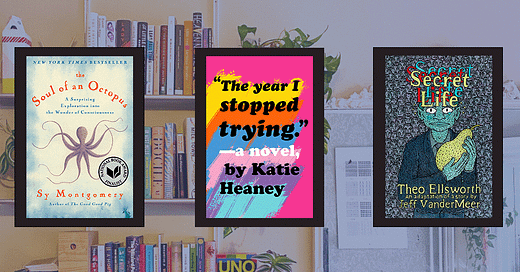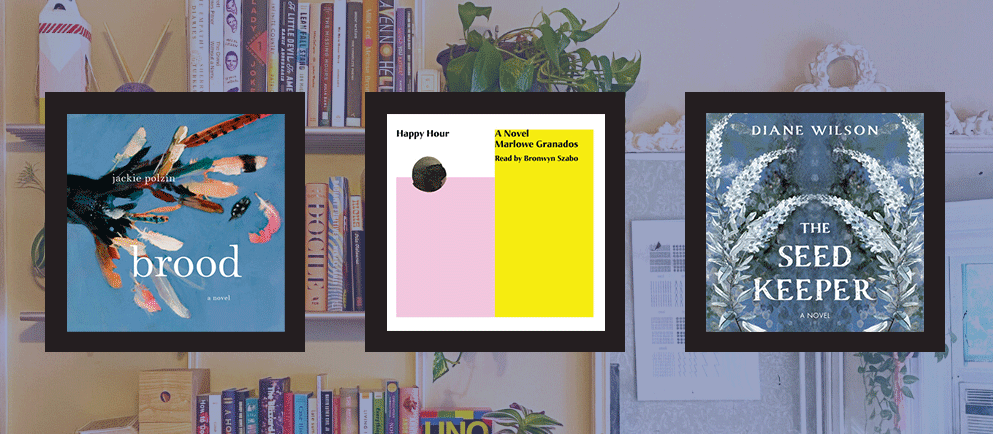"I may not know why, but I'm here."
Katie Heaney, Marlowe Granados, some cool octopuses, and more.
Friends, this letter is late, and I’m very sorry for that. Theo had a bad cold last month, and because his daycare requires kids stay home until 48 hours after symptoms end (and because “runny nose” is less a symptom than it is a toddler lifestyle) he was home with us for all but maybe half a week? It was, ah, not great.
If you’re at all familiar with enlightened/emotionally adjusted parenting content, you’ve likely seen posts about what to do if you’ve raised your voice at your child. The advice is usually along the lines of apologize, make sure they know it wasn’t their fault, try harder to stop yourself next time, using any of the gentle tactics my feeds are full of. All understandable, doable, but when you’re sitting on the floor of the bathroom soaking wet trying to get a naked, slippery, screaming 2-year-old to unhook his fingers from your shirt, to stop using his legs to leverage himself against the bathtub and avoid the water, the idea of saying, “You don’t want to take a bath. I see you’re frustrated. Why don’t we try taking some deep breaths?” is so absurd, you have to laugh. I didn’t laugh; I yelled STOP IT in a voice I didn’t even know I had, and Brendan rushed in and said okay okay okay okay and I left and cried in the bedroom. I googled yelling at your kids; I reread this essay from all-time fave Lydia Kiesling, “Becoming a Woman Who Yells at Her Children,” which, like everything Lydia writes about parenting whether in fiction or essay or social media, feels like unloading a heavy weight. See:
I am ashamed when I yell. I am ashamed when I hear my 3-year-old at play with her baby sister cry “Oh my god we’re so late,” in just exactly my panicked voice. I would like to somehow become a woman who does not yell, but the “somehow” is all wrong there. I know it will take work to become that woman. I Google “I yelled at my 3-year-old,” take comfort from other women who yell, and harvest factoids (“every negative interaction is canceled out by five positive interactions,” the blogs assure me). When I do yell, I apologize to her, and I try to explain why I yelled.
I apologized to Theo after his bath. I told him I got angry but that it wasn’t his fault and I shouldn’t have yelled at him. He was just happy to see me again which, you know—torture. He’s very interested in feelings lately, and sometimes he’ll say, “You’re angry,” when I’m not, which sends me into a brief panic until he says, “Mila is angry,” and I look at our cat, sleeping blissfully on the arm of the couch, and I realize he’s just trying out words.
Anyway. How did I end up here? Right, yes: Bad month. Better recently. I’ve got a long letter for you to make up for lost time, but I’m also opening a paid subscriber perk up to everyone: If you’d like a customized recommendation, comment below or reply to this letter and let me know what you’re looking for! Could be mood, genre, theme, all of the above—any info helps.
The Year I Stopped Trying by Katie Heaney (Knopf BYR, Nov. 16)
Katie is a close friend, collaborator, and a prolific writer, so when she said The Year I Stopped Trying is her favorite of the books she’s written I was very excited to read it. I say this as someone who wrote a book with her: She’s right. This is her best. Like, “kept me up until 4am so I could finish it and then email her to tell her how much it made me cry” good. It follows Mary, a high school overachiever who, after accidentally forgetting to do her homework for the first time in all her years as a student, realizes the consequences aren’t nearly as disastrous as she feared. This sets off a campaign toward mediocrity—doing the bare minimum just because—the effects of which ripple through her friendships, love life, shitty job, and family. It’s a recalibration of identity and meaning.
I’d been thinking that the central dilemma of my existence was that I’m here and don’t know why, but maybe I had that backward: I may not know why, but I’m here.
This is YA but you should consider it even if that’s not a genre you usually go for. I think it’s fair to say genres tend to be linked in tone or style, and equally fair to decide a tone or style just isn’t for you, but having read a fair amount of YA, I just found so much of this—the voice, the pacing, the characterization—to be completely in sync with any other general adult/literary fiction. My elevator pitch has been “think My Year of Rest and Relaxation but about about a 16-year-old overachiever who’s realized nothing matters” which gets at a lot of what I love about it.
Katie is skillfully restrained in her descriptions of Mary’s worlds, both interior and exterior, in a way that rings true for an existential crisis that has manifested as ennui, and which threatens everything she once held certain. Mary’s family is perfectly incorporated—little bits of scenery and dialogue are all we need to get a sense of the dynamics that have shaped Mary’s understanding of the world and herself; the fact that she doesn’t ruminate on them shows how mundane and ingrained their impact is. There’s an intentional openness throughout, which is something I always appreciate as a reader. It also makes it VERY easy to read in one sitting, so be warned.
It’s so smart and touching and funny. This is my favorite of Katie’s books but it’s also one of my favorites of the year.
Secret Life by Theo Ellsworth, adapted from a short story by Jeff VanderMeer (Drawn & Quarterly, out now)
I’ve been a big fan of Theo Ellsworth and his intricate, otherworldly, often grotesque illustrations ever since I picked up his anthology Capacity at a comics festival years back. I can’t imagine a better person to adapt Jeff VanderMeer. Secret Life is based on the title story from a now out of print 2004 collection (I wanted to find a copy but, man, it is pricey!) about a dystopian office building that houses feuding workers, human sacrifices, conscious mice and vines traveling through the dark, and other horrors. It’s an unsettling but beautifully rendered take on bureaucratic cruelty and the dehumanization inherent in capitalism. Avoid reading in the dark.
The Soul of an Octopus: A Surprising Exploration into the Wonder of Consciousness by Sy Montgomery (Atria, out now)
Let’s get this part over with: I got this book because, while in a sort of half-asleep state during a recent reiki session, I had a “dream” about an octopus and since then I’ve been like, hmm, what am I supposed to learn from this octopus? Okay?!??!?!?!??!?!?!?! Okay. Anyway, I love this book. Naturalist Sy Montgomery dives deep (hehe) into the worlds of various octopuses at the New England Aquarium and beyond—gentle Athena, self-assured Octavia, and mischievous Kali are some highlights—and reveals their personalities, their brilliance, their vitality. It’s just an absolute delight, and opens up into big questions about consciousness and humanity. Maybe I’ll get an octopus tattoo. I don’t know!!!!!
Listening to:
Happy Hour by Marlowe Granados, read by Bronwyn Szabo
I’ve been shouting about this book, and specifically Szabo’s narration, since I started it. Truly it’s a work of art, only elevated by Szabo’s conversational reading. The laugh-out-loud funny debut follows 21-year-old Isa, Canadian of Filipina and Salvadoran descent, as she chronicles a summer spent in New York with her best friend Gala. The two are there doing “nothing” which really means doing everything—collecting cultural and social experiences and financing it with odd jobs (off the book, since they aren’t legal citizens) wherever they can find them. They’re young and hot and vibrant and so much fun. They’re also, way too often, underestimated.
Pretty privilege is real; it also comes with a specific kind of disrespect. I know I have benefitted from it, but it also means I spent ages 16-24 condescended to by men who would’ve had me believe femininity equals stupidity, who would’ve dismissed me entirely if they didn’t want to sleep with me. I’ve never read someone skewer so perfectly this specific kind of misogyny—the one that sours as soon as the guy in question realizes the woman he’s talking to isn’t a caricature—as Granados does here. Take this moment, when Isa recalls a guy making fun of her for saying she loved a certain neighborhood in New York that he deemed too popular to be cool:
I realize now, the older you get, the harder it is to be impressed because people make you feel ashamed of ever being impressed by anything at all. I keep many glowing remarks to myself because of this.
Isa understands how the world interprets her youth, beauty, and race, and she uses this to make calculated decisions about how much of herself to give or hide in any situation. But she always knows who she is. She’s a step ahead of everyone who underestimates her and adjusts accordingly. She would’ve meant the world to me at 21, but I fell in love with her at 35, too.
The Seed Keeper by Diane Wilson, read by Kyla García
I rediscovered Dakhóta memoirist Diane Wilson’s debut novel when I took this Libro.fm quiz for audiobooks by Indigenous authors—I’d started it and loved it back in February, but lost track of it somewhere along the way. Starting anew in audio hooked me immediately. The story follows Rosalie Iron Wing, a recently widowed Dakhóta woman who returns to the abandoned home she was taken from at 12 years old, when her father died and the state placed her into foster care. Rosalie’s rediscovery of her heritage, especially through relationships with her great aunt and an old acquaintance, is profound, and Wilson’s writing of the natural world, explored from the perspective of seeds before and after white settlers’ destruction, is exquisite.
Brood by Jackie Polzin, read by Rebecca Lowman
Over the course of a year, a nameless narrator in rural Minnesota cares after her small brood of four chickens. It doesn’t sound like much, but Polzin takes these small, quiet moments of mundanity, and even drudgery, and expands them into profound meditations on loss, love, and resilience, especially affecting when it becomes clear that this narrator is coming to terms with a miscarriage. Lowman’s narration is somehow both gentle and powerful. I paused often to either bookmark or jot down lines that floored me, but one that has really stuck with me came while the narrator reflected on the disorientation and abandonment she felt when she realized there wouldn’t be another pregnancy:
“It turns out the world accepts failure only insofar as you keep trying.”
The book is small but full of stunners like this.
Etc.:
Do you have an idea for a book podcast that you want to turn into a reality? Are you based in New York? Pitch me!
I reviewed a strange little murder mystery called Lemon at Vulture.
I blogged about underrated audiobooks at Libro.fm (some you’ll have read about here!)
If you’d like to support Reading Habits, you can:
Buy books through the Bookshop and/or Libro.fm links in this letter, or at my Bookshop page
Become a paid subscriber — $5/month or $40/year will get you monthly personalized book recommendations and access to exclusive author interviews
Tell people about it! 🙏🏼





